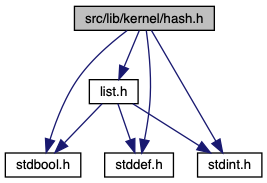
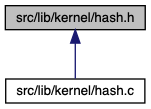
Go to the source code of this file.
Data Structures | |
| struct | hash_elem |
| Hash table. More... | |
| struct | hash |
| Hash table. More... | |
| struct | hash_iterator |
| A hash table iterator. More... | |
Macros | |
| #define | hash_entry(HASH_ELEM, STRUCT, MEMBER) |
| Converts pointer to hash element HASH_ELEM into a pointer to the structure that HASH_ELEM is embedded inside. More... | |
Typedefs | |
| typedef unsigned | hash_hash_func(const struct hash_elem *e, void *aux) |
| Computes and returns the hash value for hash element E, given auxiliary data AUX. More... | |
| typedef bool | hash_less_func(const struct hash_elem *a, const struct hash_elem *b, void *aux) |
| Compares the value of two hash elements A and B, given auxiliary data AUX. More... | |
| typedef void | hash_action_func(struct hash_elem *e, void *aux) |
| Performs some operation on hash element E, given auxiliary data AUX. More... | |
Functions | |
| bool | hash_init (struct hash *, hash_hash_func *, hash_less_func *, void *aux) |
| Basic life cycle. More... | |
| void | hash_clear (struct hash *, hash_action_func *) |
| Removes all the elements from H. More... | |
| void | hash_destroy (struct hash *, hash_action_func *) |
| Destroys hash table H. More... | |
| struct hash_elem * | hash_insert (struct hash *, struct hash_elem *) |
| Search, insertion, deletion. More... | |
| struct hash_elem * | hash_replace (struct hash *, struct hash_elem *) |
| Inserts NEW into hash table H, replacing any equal element already in the table, which is returned. More... | |
| struct hash_elem * | hash_find (struct hash *, struct hash_elem *) |
| Finds and returns an element equal to E in hash table H, or a null pointer if no equal element exists in the table. More... | |
| struct hash_elem * | hash_delete (struct hash *, struct hash_elem *) |
| Finds, removes, and returns an element equal to E in hash table H. More... | |
| void | hash_apply (struct hash *, hash_action_func *) |
| Iteration. More... | |
| void | hash_first (struct hash_iterator *, struct hash *) |
| Initializes I for iterating hash table H. More... | |
| struct hash_elem * | hash_next (struct hash_iterator *) |
| Advances I to the next element in the hash table and returns it. More... | |
| struct hash_elem * | hash_cur (struct hash_iterator *) |
| Returns the current element in the hash table iteration, or a null pointer at the end of the table. More... | |
| size_t | hash_size (struct hash *) |
| Information. More... | |
| bool | hash_empty (struct hash *) |
| Returns true if H contains no elements, false otherwise. More... | |
| unsigned | hash_bytes (const void *, size_t) |
| Sample hash functions. More... | |
| unsigned | hash_string (const char *) |
| Returns a hash of string S. More... | |
| unsigned | hash_int (int) |
| lib/kernel/hash.h More... | |
Macro Definition Documentation
◆ hash_entry
| #define hash_entry | ( | HASH_ELEM, | |
| STRUCT, | |||
| MEMBER | |||
| ) |
Converts pointer to hash element HASH_ELEM into a pointer to the structure that HASH_ELEM is embedded inside.
Supply the name of the outer structure STRUCT and the member name MEMBER of the hash element. See the big comment at the top of the file for an example.
Typedef Documentation
◆ hash_action_func
| typedef void hash_action_func(struct hash_elem *e, void *aux) |
◆ hash_hash_func
| typedef unsigned hash_hash_func(const struct hash_elem *e, void *aux) |
◆ hash_less_func
Function Documentation
◆ hash_apply()
| void hash_apply | ( | struct hash * | h, |
| hash_action_func * | action | ||
| ) |
Iteration.
Iteration.
Modifying hash table H while hash_apply() is running, using any of the functions hash_clear(), hash_destroy(), hash_insert(), hash_replace(), or hash_delete(), yields undefined behavior, whether done from ACTION or elsewhere.
Definition at line 163 of file hash.c.
References ASSERT, hash::aux, hash::bucket_cnt, hash::buckets, list_begin(), list_elem_to_hash_elem, list_end(), list_next(), next(), and NULL.
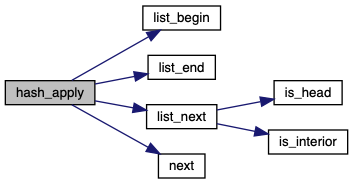
◆ hash_bytes()
| unsigned hash_bytes | ( | const void * | buf_, |
| size_t | size | ||
| ) |
Sample hash functions.
Sample hash functions.
Definition at line 266 of file hash.c.
References ASSERT, buf, FNV_32_BASIS, FNV_32_PRIME, and NULL.
Referenced by hash_int().

◆ hash_clear()
| void hash_clear | ( | struct hash * | h, |
| hash_action_func * | destructor | ||
| ) |
Removes all the elements from H.
If DESTRUCTOR is non-null, then it is called for each element in the hash. DESTRUCTOR may, if appropriate, deallocate the memory used by the hash element. However, modifying hash table H while hash_clear() is running, using any of the functions hash_clear(), hash_destroy(), hash_insert(), hash_replace(), or hash_delete(), yields undefined behavior, whether done in DESTRUCTOR or elsewhere.
Definition at line 54 of file hash.c.
References hash::aux, hash::bucket_cnt, hash::buckets, hash::elem_cnt, list_elem_to_hash_elem, list_empty(), list_init(), list_pop_front(), and NULL.
Referenced by hash_destroy(), and hash_init().


◆ hash_cur()
| struct hash_elem* hash_cur | ( | struct hash_iterator * | i | ) |
Returns the current element in the hash table iteration, or a null pointer at the end of the table.
Undefined behavior after calling hash_first() but before hash_next().
Definition at line 241 of file hash.c.
References hash_iterator::elem.
◆ hash_delete()
Finds, removes, and returns an element equal to E in hash table H.
Returns a null pointer if no equal element existed in the table.
If the elements of the hash table are dynamically allocated, or own resources that are, then it is the caller's responsibility to deallocate them.
Definition at line 145 of file hash.c.
References find_bucket(), find_elem(), NULL, rehash(), and remove_elem().
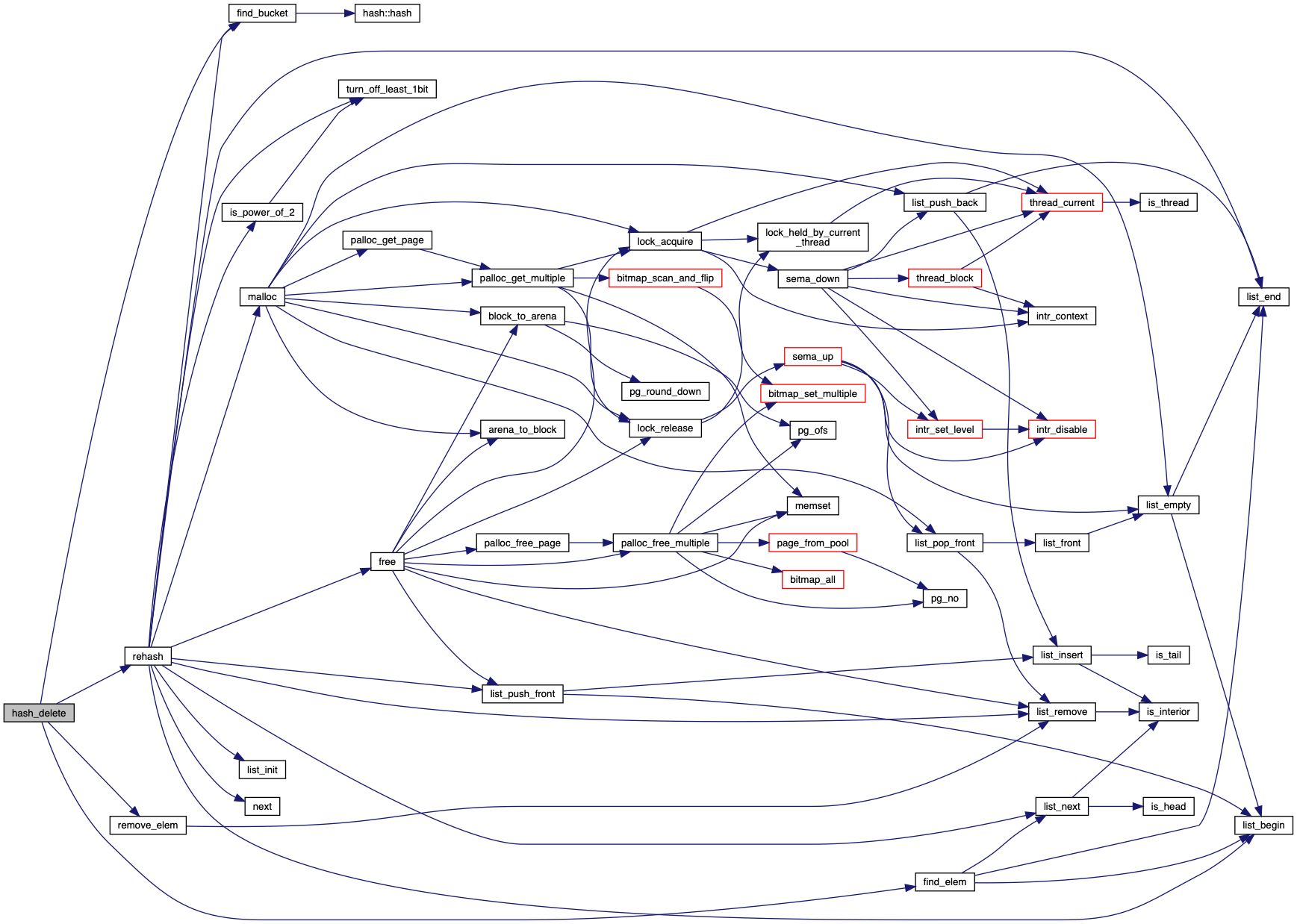
◆ hash_destroy()
| void hash_destroy | ( | struct hash * | h, |
| hash_action_func * | destructor | ||
| ) |
Destroys hash table H.
If DESTRUCTOR is non-null, then it is first called for each element in the hash. DESTRUCTOR may, if appropriate, deallocate the memory used by the hash element. However, modifying hash table H while hash_clear() is running, using any of the functions hash_clear(), hash_destroy(), hash_insert(), hash_replace(), or hash_delete(), yields undefined behavior, whether done in DESTRUCTOR or elsewhere.
Definition at line 87 of file hash.c.
References hash::buckets, free(), hash_clear(), and NULL.
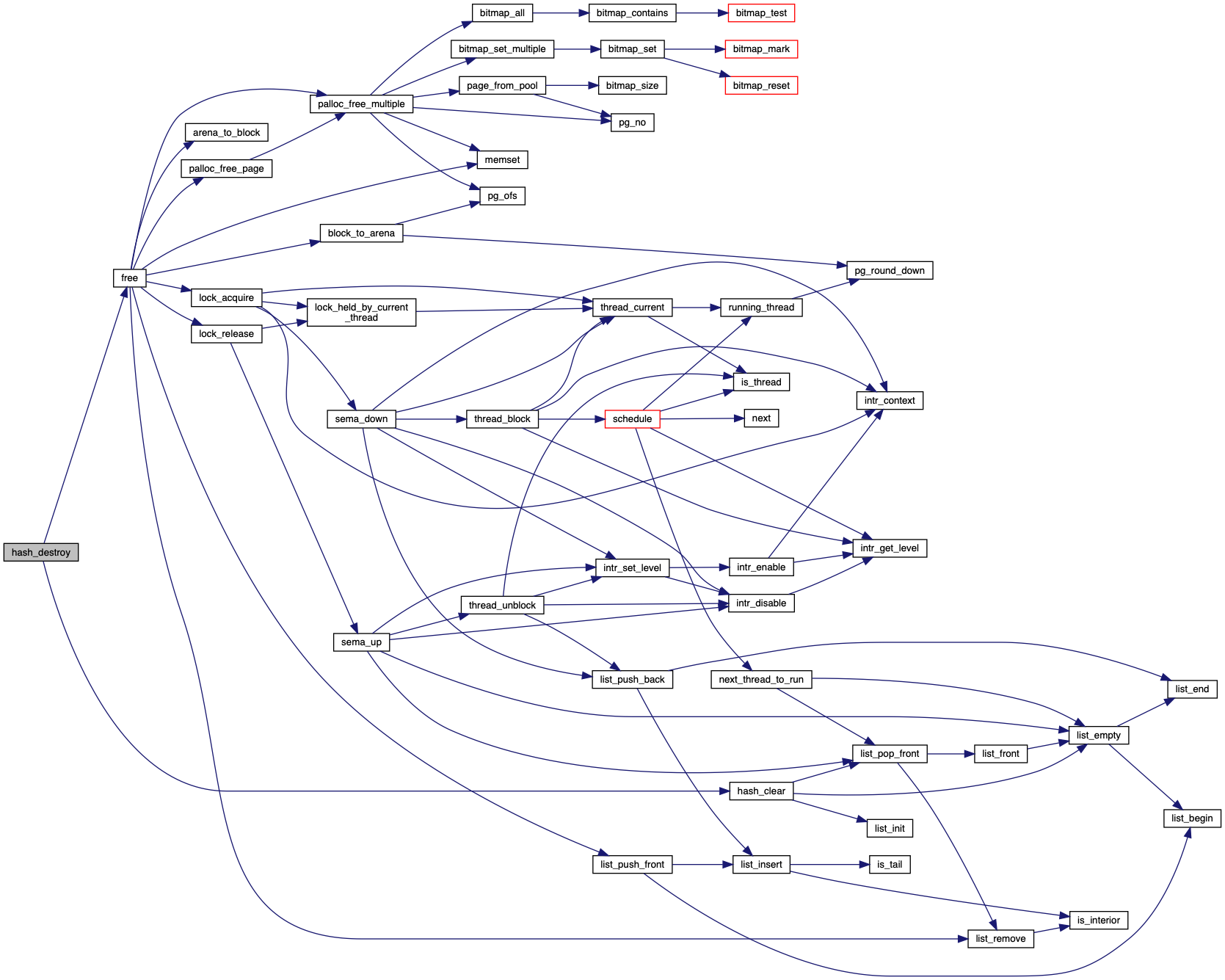
◆ hash_empty()
Returns true if H contains no elements, false otherwise.
Definition at line 255 of file hash.c.
References hash::elem_cnt.
◆ hash_find()
Finds and returns an element equal to E in hash table H, or a null pointer if no equal element exists in the table.
Definition at line 132 of file hash.c.
References find_bucket(), and find_elem().
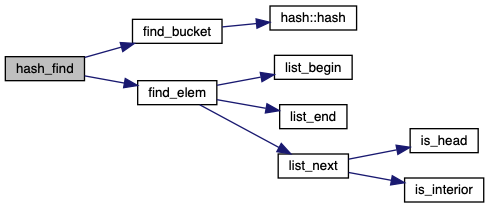
◆ hash_first()
| void hash_first | ( | struct hash_iterator * | i, |
| struct hash * | h | ||
| ) |
Initializes I for iterating hash table H.
Iteration idiom:
struct hash_iterator i;
hash_first (&i, h); while (hash_next (&i)) { struct foo *f = hash_entry (hash_cur (&i), struct foo, elem); ...do something with f... }
Modifying hash table H during iteration, using any of the functions hash_clear(), hash_destroy(), hash_insert(), hash_replace(), or hash_delete(), invalidates all iterators.
Definition at line 200 of file hash.c.
References ASSERT, hash_iterator::bucket, hash::buckets, hash_iterator::elem, hash_iterator::hash, list_elem_to_hash_elem, list_head(), and NULL.

◆ hash_init()
| bool hash_init | ( | struct hash * | h, |
| hash_hash_func * | hash, | ||
| hash_less_func * | less, | ||
| void * | aux | ||
| ) |
Basic life cycle.
Basic life cycle.
Definition at line 25 of file hash.c.
References hash::aux, hash::bucket_cnt, hash::buckets, hash::elem_cnt, hash::hash, hash_clear(), hash::less, malloc(), and NULL.
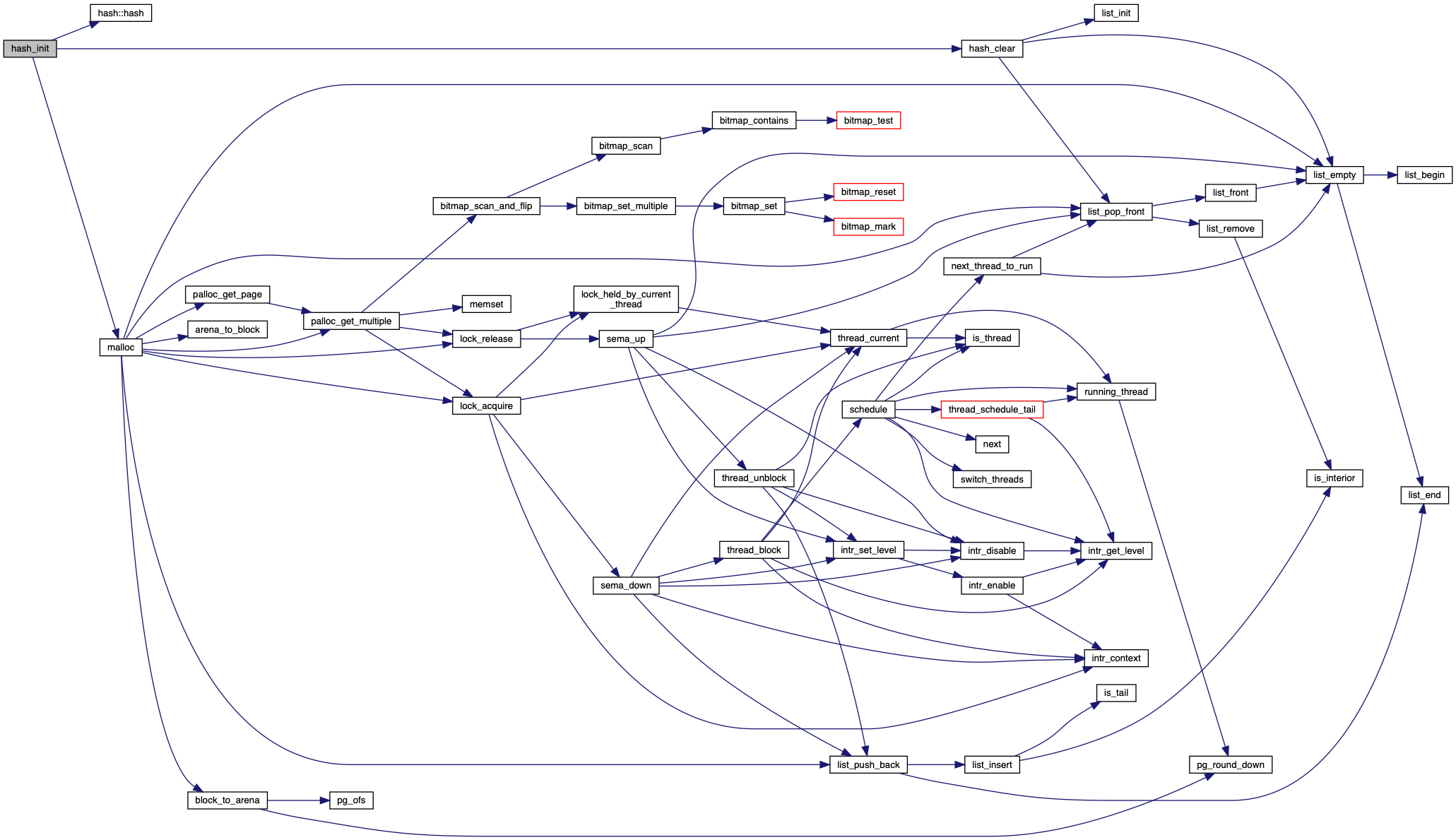
◆ hash_insert()
Search, insertion, deletion.
Search, insertion, deletion.
If an equal element is already in the table, returns it without inserting NEW.
Definition at line 99 of file hash.c.
References find_bucket(), find_elem(), insert_elem(), NULL, and rehash().
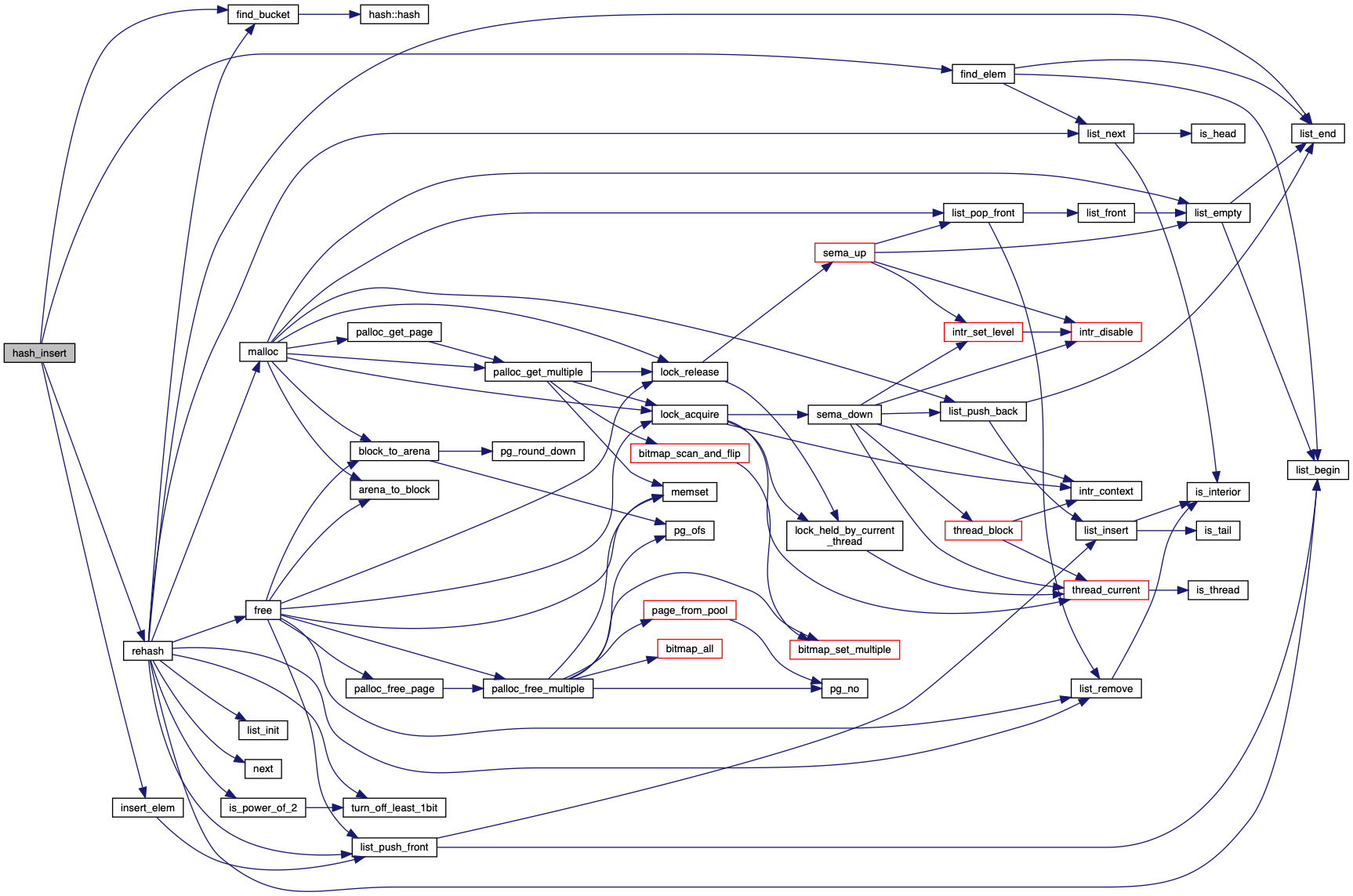
◆ hash_int()
| unsigned hash_int | ( | int | i | ) |
Definition at line 299 of file hash.c.
References hash_bytes().

◆ hash_next()
| struct hash_elem* hash_next | ( | struct hash_iterator * | i | ) |
Advances I to the next element in the hash table and returns it.
Returns a null pointer if no elements are left. Elements are returned in arbitrary order.
Modifying a hash table H during iteration, using any of the functions hash_clear(), hash_destroy(), hash_insert(), hash_replace(), or hash_delete(), invalidates all iterators.
Definition at line 219 of file hash.c.
References ASSERT, hash_iterator::bucket, hash::bucket_cnt, hash::buckets, hash_iterator::elem, hash_iterator::hash, list_begin(), hash_elem::list_elem, list_elem_to_hash_elem, list_end(), list_next(), and NULL.
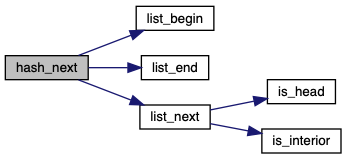
◆ hash_replace()
Inserts NEW into hash table H, replacing any equal element already in the table, which is returned.
Definition at line 115 of file hash.c.
References find_bucket(), find_elem(), insert_elem(), NULL, rehash(), and remove_elem().
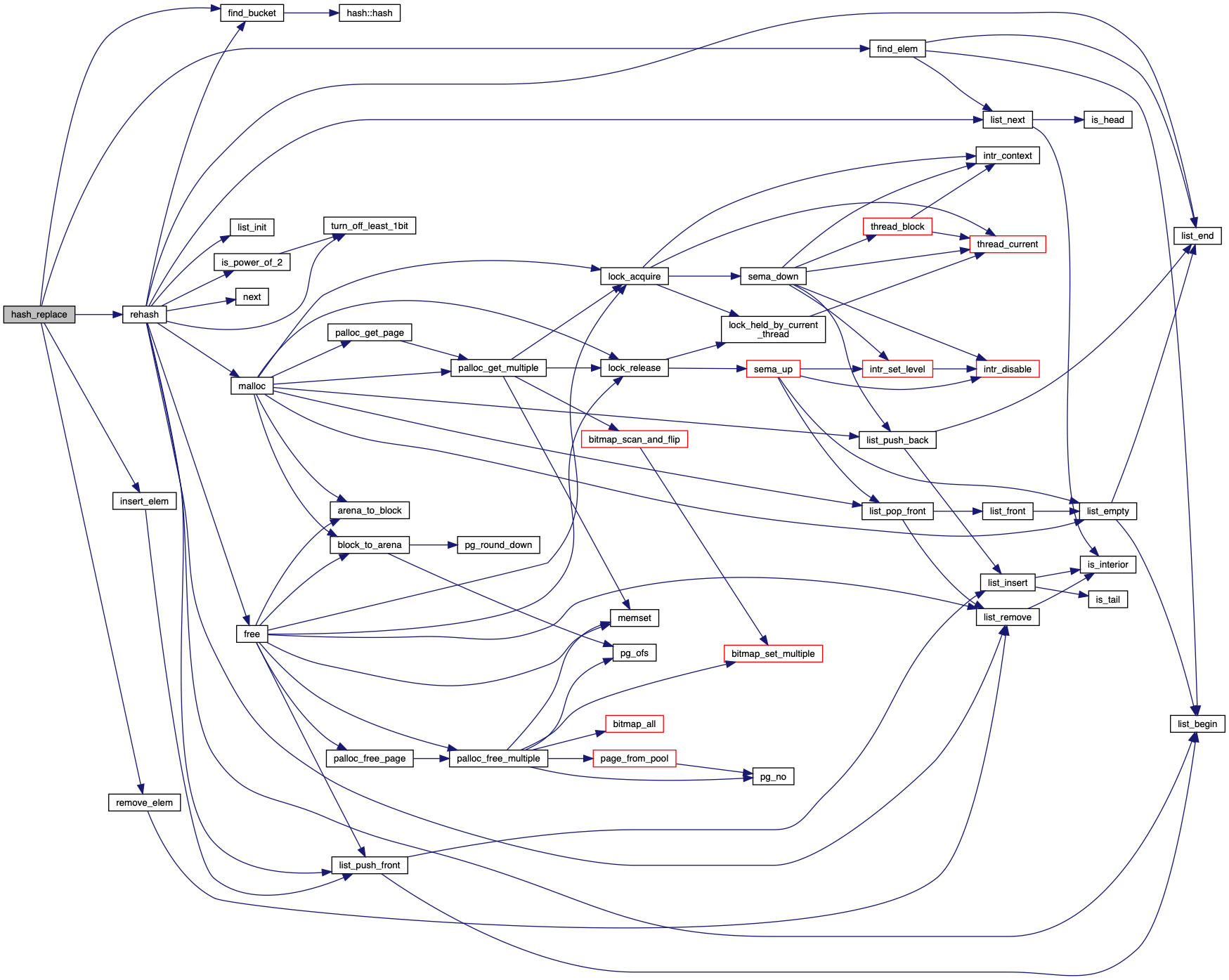
◆ hash_size()
◆ hash_string()
| unsigned hash_string | ( | const char * | ) |
Returns a hash of string S.
Definition at line 283 of file hash.c.
References ASSERT, FNV_32_BASIS, FNV_32_PRIME, NULL, and s.
 1.8.16
1.8.16